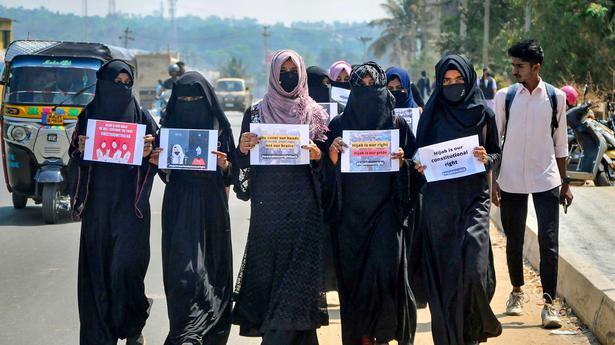
Explained | Did the Karnataka High Court’s hijab verdict overlook ‘reasonable accommodation’?
The Hindu
In the Karnataka High Court ruling on the hijab, what principle used in disability rights was not considered?
The story so far: The Karnataka High Court has ruled in favour of the State’s circular that students in educational institutions should only wear prescribed uniforms, and where no code was prescribed, they should wear “such attire that would accord with equality and integrity and would not disrupt public order”. The decision effectively upheld the denial of entry to students wearing the hijab. The court rejected an argument in support of permitting Muslim girls wearing head-scarves that was based on the principle of ‘reasonable accommodation’. This meant that the court did not favour making any change or adjustment to the rule that could have enabled the students to maintain their belief or practice even while adhering to the uniform rule.
‘Reasonable accommodation’ is a principle that promotes equality, enables the grant of positive rights and prevents discrimination based on disability, health condition or personal belief. Its use is primarily in the disability rights sector.
Editorial | Essentially flawed: On the Karnataka High Court’s hijab verdict
Article 2 of the UN Convention on the Rights of People with Disabilities (UNCRPD) defines reasonable accommodation as “necessary and appropriate modification and adjustments not imposing a disproportionate or undue burden, where needed in a particular case, to ensure to persons with disabilities the enjoyment or exercise on an equal basis with others of all human rights and fundamental freedoms”.
The International Labour Organization (ILO), in its recommendation on HIV/AIDS and the world of work, defines it as “any modification or adjustment to a job or to the workplace that is reasonably practicable and enables a person living with HIV or AIDS to have access to, or participate or advance in, employment”.
The general principle is that reasonable accommodation should be provided, unless some undue hardship is caused by such accommodation.
In 2016, the ILO came out with a practical guide on promoting diversity and inclusion through workplace adjustments. The need for workplace accommodation may arise in a variety of situations, but four categories of workers were chosen for the guide: workers with disabilities, workers living with HIV and AIDS, pregnant workers and those with family responsibilities, and workers who hold a particular religion or belief. These categories of workers come across different kinds of barriers at work. These may result in either loss of employment or lack of access to employment. “The provision of reasonable accommodation plays a major role in addressing these barriers and thus contributes to greater workplace equality, diversity and inclusion,” says the ILO guide.













